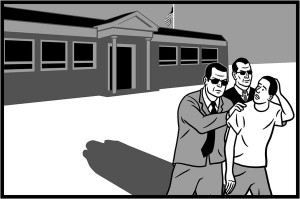
The Great Cyber-Heist
New York Times
By JAMES VERINI
November 10, 2010

Mid-1990s: Gonzalez, 14, is visited by F.B.I. agents at his high school for hacking into NASA.
Gonzalez, law-enforcement officials would discover, was more than just a casher. He was a moderator and rising star on Shadowcrew.com, an archetypal criminal cyberbazaar that sprang up during the Internet-commerce boom in the early 2000s. Its users trafficked in databases of stolen card accounts and devices like magnetic strip-encoders and card-embossers; they posted tips on vulnerable banks and stores and effective e-mail scams. Created by a part-time student in Arizona and a former mortgage broker in New Jersey, Shadowcrew had hundreds of members across the United States, Europe and Asia. It was, as one federal prosecutor put it to me, “an eBay, Monster.com and MySpace for cybercrime.”
Phi Beta Iota: We opened Hackers on Planet Earth (HOPE) in 1994, making the observation that when the Israeli's captured a hacker they gave him a job, while the US simply kicked them in the teeth and sent them to jail. We tried to keep Phiber Optic out of jail, and we have for decades been on record comparing hackers to astronauts–full of the right stuff and pushing the edge of the envelope. No one, including Marty Harris then in charge of the National Information Infrastructure (NII) wanted to listen. Today the US Government is again ignoring the warnings on the urgency of getting a grip on all information in all languages all the time, and roughly 20 years behind in creating “root” cyber-security. This article by James Verini is a phenomenal update on what we all knew in the mid-1990's that the US Government is still oblivious to–this is not a problem technology or wanton spending can solve–this is a problem that demands discipline, integrity, intelligence, and sharing. It is neither possible nor desireable to secure government or military computers in isolation–this is an “all in” smart safe nation challenge.
See Also:
1994 Sounding the Alarm on Cyber-Security
Search: smart nation intelligence reform electoral reform national security reform
Memorandum: Talking Points on Homeland Defense Intelligence
2010: OPINION–America’s Cyber Scam
Journal: Cyber-Security or Cyber-Scam? Plus Short List of Links to Reviews and Books on Hacking 101
Review: Dear Hacker–Letters to the Editor of 2600
Review: The Best of 2600–A Hacker Odyssey
Communications & Computing
Review: Computer-Related Risks
Review: CYBERPUNK–Outlaws and Hackers on the Computer Frontier, Revised
Review: Database Nation –The Death of Privacy in the 21st Century (Paperback)
Review: Masters of Deception–The Gang That Ruled Cyberspace
Review: Networks and Netwars–The Future of Terror, Crime, and Militancy
Review: Stealing the Network–How to Own a Continent
Review: The Best of 2600–A Hacker Odyssey
Review: The Hacker Crackdown–Law And Disorder On The Electronic Frontier
NOTE: Hackers as pioneers pushing the edge of the envelope, are represented in Worth a Look: Book Reviews on Innovation.



